Organisation Theory: Approaches, Forces, and Future Developments
VerifiedAdded on 2023/01/13
|11
|2831
|97
Report
AI Summary
This report provides a comprehensive overview of organisation theory, beginning with an introduction to the subject and outlining the structure of the essay. It delves into the classical approach, analyzing key theories such as Scientific Management by Frederick Taylor, the Principles of Management by Henry Fayol, and Max Weber's Bureaucracy, with appropriate references. The report then explores the neo-classical approach, examining the Human Relations School, including the contributions of Elton Mayo, as well as McGregor's Contingency Theory, again supported by references. The core of the report focuses on the forces shaping the future of organizations, including customer orientation, the culture-excellence approach, the Japanese approach, and organizational learning. Furthermore, it discusses recent developments in organizational theory, such as modernist, postmodernist, realist, and complexity perspectives, along with the importance of technology, cultural perspectives, and power-politics perspectives, all aimed at understanding and predicting future organizational structures and practices. The report concludes by summarizing the key findings and insights presented throughout the analysis.
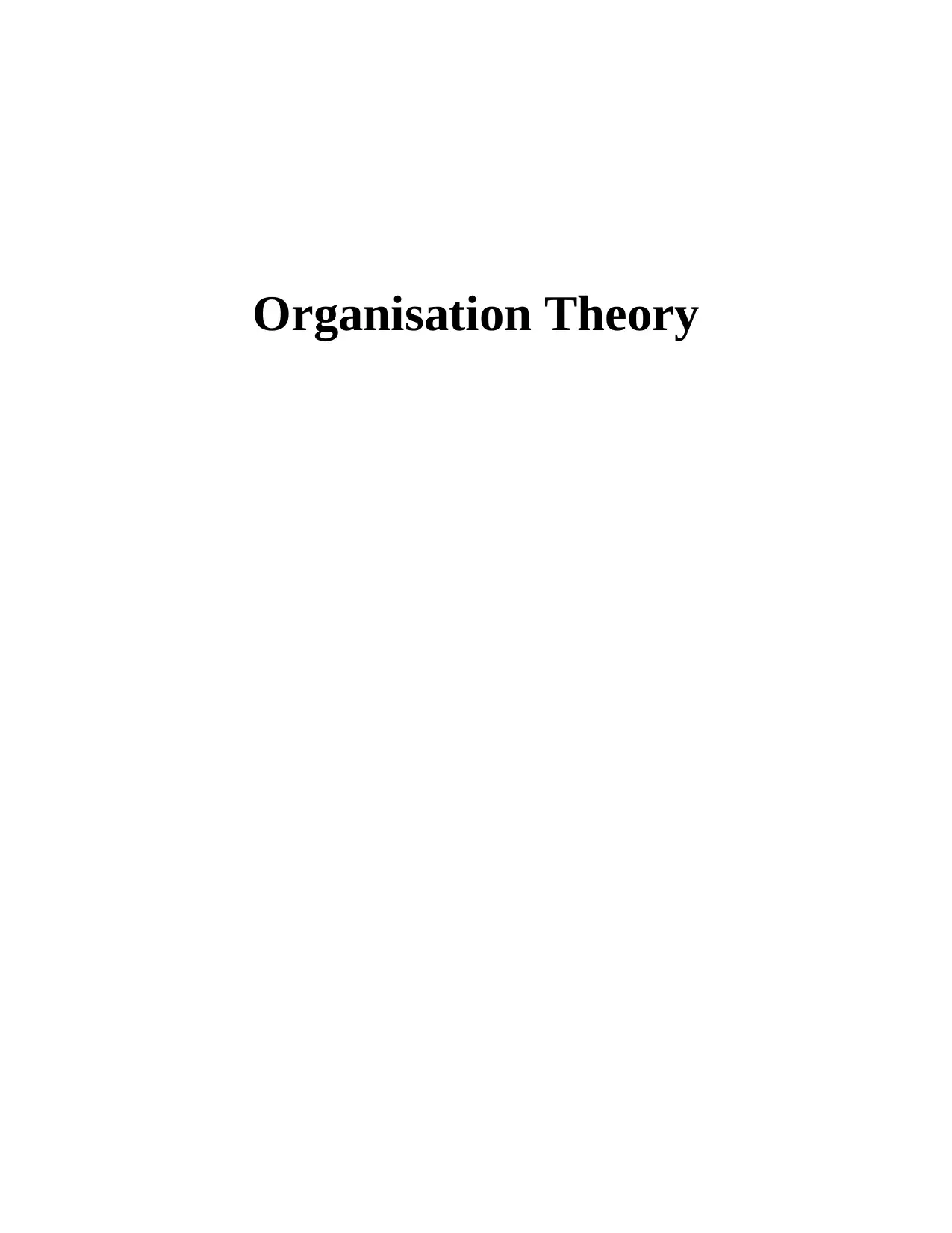
Organisation Theory
Paraphrase This Document
Need a fresh take? Get an instant paraphrase of this document with our AI Paraphraser
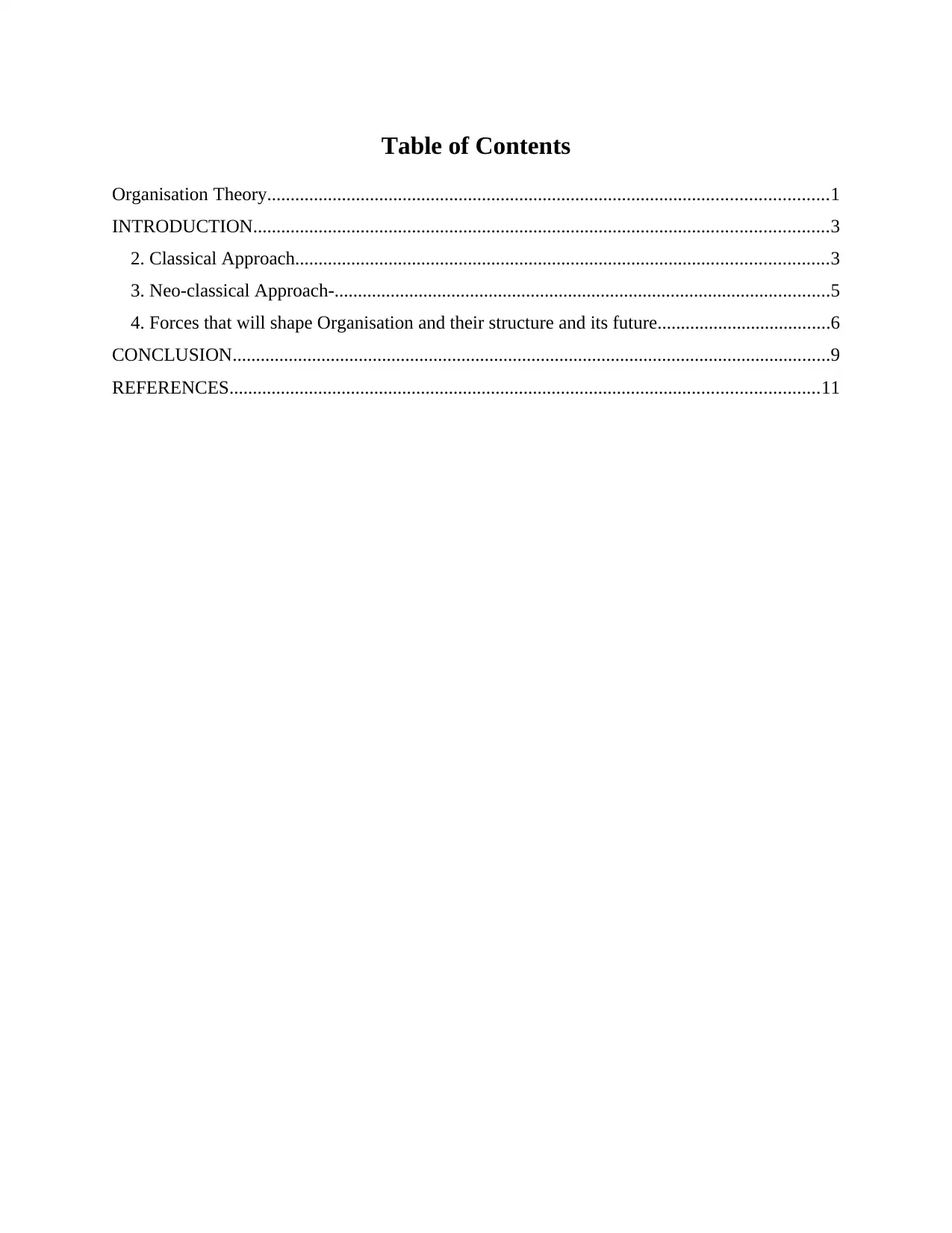
Table of Contents
Organisation Theory........................................................................................................................1
INTRODUCTION...........................................................................................................................3
2. Classical Approach..................................................................................................................3
3. Neo-classical Approach-..........................................................................................................5
4. Forces that will shape Organisation and their structure and its future.....................................6
CONCLUSION................................................................................................................................9
REFERENCES..............................................................................................................................11
Organisation Theory........................................................................................................................1
INTRODUCTION...........................................................................................................................3
2. Classical Approach..................................................................................................................3
3. Neo-classical Approach-..........................................................................................................5
4. Forces that will shape Organisation and their structure and its future.....................................6
CONCLUSION................................................................................................................................9
REFERENCES..............................................................................................................................11
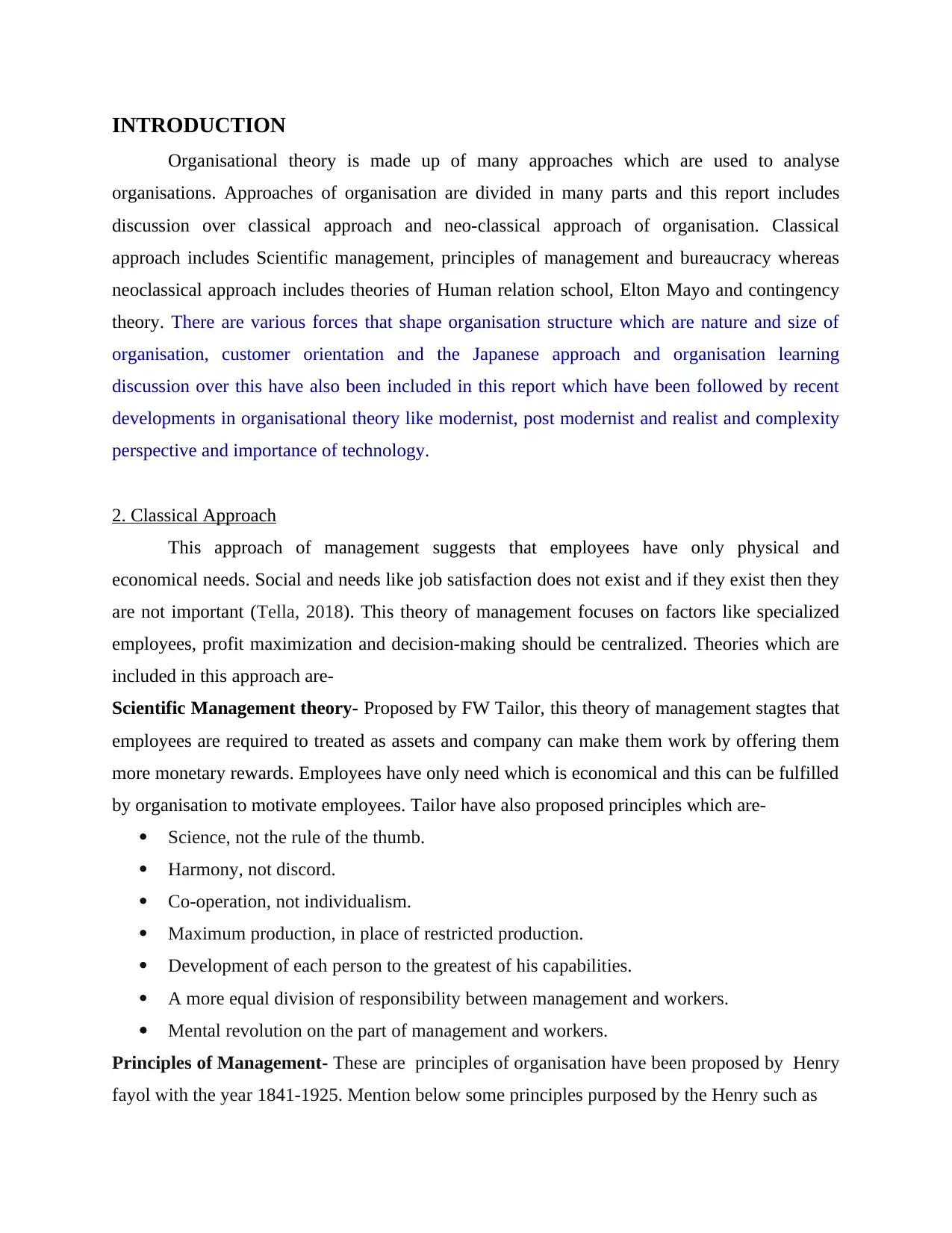
INTRODUCTION
Organisational theory is made up of many approaches which are used to analyse
organisations. Approaches of organisation are divided in many parts and this report includes
discussion over classical approach and neo-classical approach of organisation. Classical
approach includes Scientific management, principles of management and bureaucracy whereas
neoclassical approach includes theories of Human relation school, Elton Mayo and contingency
theory. There are various forces that shape organisation structure which are nature and size of
organisation, customer orientation and the Japanese approach and organisation learning
discussion over this have also been included in this report which have been followed by recent
developments in organisational theory like modernist, post modernist and realist and complexity
perspective and importance of technology.
2. Classical Approach
This approach of management suggests that employees have only physical and
economical needs. Social and needs like job satisfaction does not exist and if they exist then they
are not important (Tella, 2018). This theory of management focuses on factors like specialized
employees, profit maximization and decision-making should be centralized. Theories which are
included in this approach are-
Scientific Management theory- Proposed by FW Tailor, this theory of management stagtes that
employees are required to treated as assets and company can make them work by offering them
more monetary rewards. Employees have only need which is economical and this can be fulfilled
by organisation to motivate employees. Tailor have also proposed principles which are-
Science, not the rule of the thumb.
Harmony, not discord.
Co-operation, not individualism.
Maximum production, in place of restricted production.
Development of each person to the greatest of his capabilities.
A more equal division of responsibility between management and workers.
Mental revolution on the part of management and workers.
Principles of Management- These are principles of organisation have been proposed by Henry
fayol with the year 1841-1925. Mention below some principles purposed by the Henry such as
Organisational theory is made up of many approaches which are used to analyse
organisations. Approaches of organisation are divided in many parts and this report includes
discussion over classical approach and neo-classical approach of organisation. Classical
approach includes Scientific management, principles of management and bureaucracy whereas
neoclassical approach includes theories of Human relation school, Elton Mayo and contingency
theory. There are various forces that shape organisation structure which are nature and size of
organisation, customer orientation and the Japanese approach and organisation learning
discussion over this have also been included in this report which have been followed by recent
developments in organisational theory like modernist, post modernist and realist and complexity
perspective and importance of technology.
2. Classical Approach
This approach of management suggests that employees have only physical and
economical needs. Social and needs like job satisfaction does not exist and if they exist then they
are not important (Tella, 2018). This theory of management focuses on factors like specialized
employees, profit maximization and decision-making should be centralized. Theories which are
included in this approach are-
Scientific Management theory- Proposed by FW Tailor, this theory of management stagtes that
employees are required to treated as assets and company can make them work by offering them
more monetary rewards. Employees have only need which is economical and this can be fulfilled
by organisation to motivate employees. Tailor have also proposed principles which are-
Science, not the rule of the thumb.
Harmony, not discord.
Co-operation, not individualism.
Maximum production, in place of restricted production.
Development of each person to the greatest of his capabilities.
A more equal division of responsibility between management and workers.
Mental revolution on the part of management and workers.
Principles of Management- These are principles of organisation have been proposed by Henry
fayol with the year 1841-1925. Mention below some principles purposed by the Henry such as
⊘ This is a preview!⊘
Do you want full access?
Subscribe today to unlock all pages.

Trusted by 1+ million students worldwide
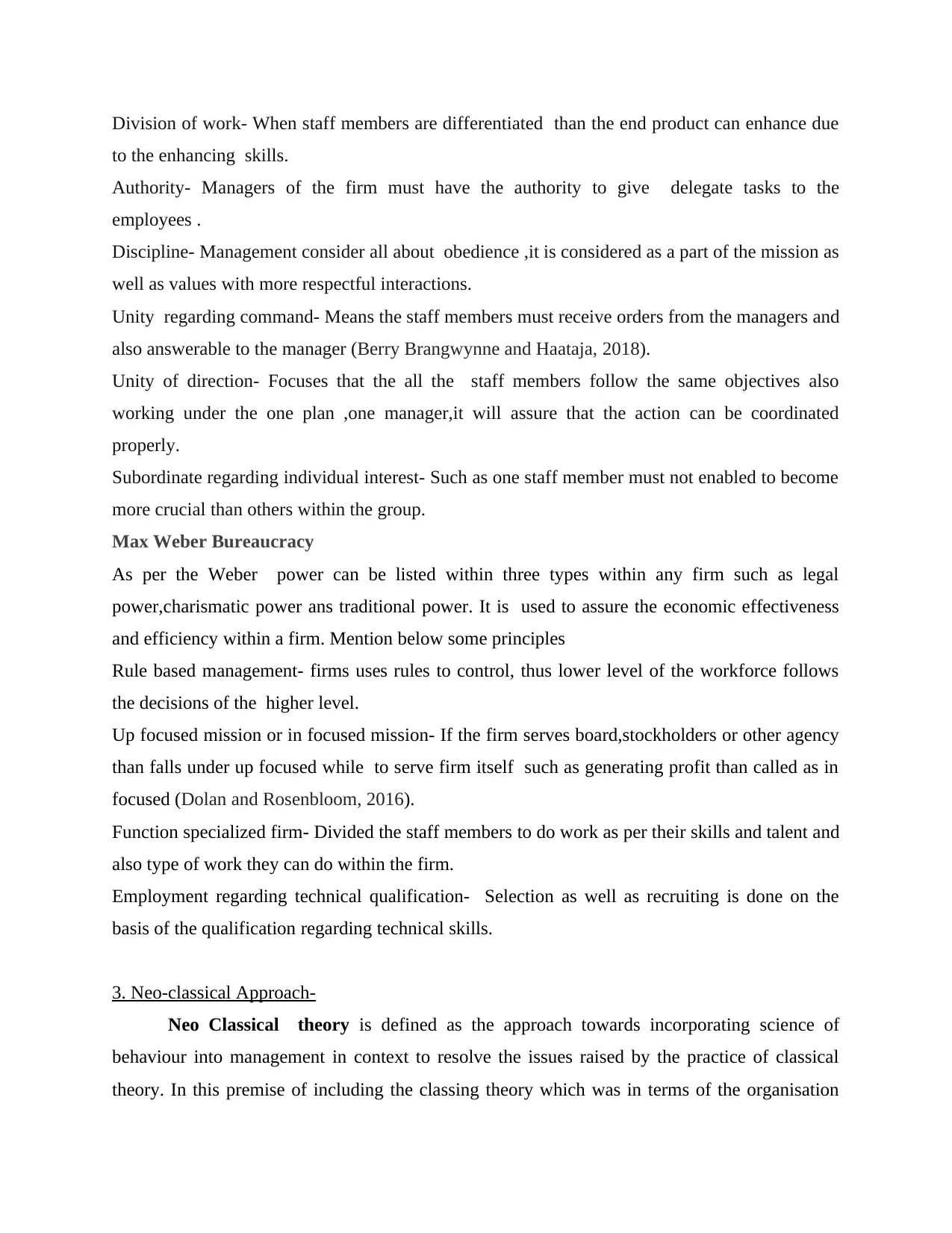
Division of work- When staff members are differentiated than the end product can enhance due
to the enhancing skills.
Authority- Managers of the firm must have the authority to give delegate tasks to the
employees .
Discipline- Management consider all about obedience ,it is considered as a part of the mission as
well as values with more respectful interactions.
Unity regarding command- Means the staff members must receive orders from the managers and
also answerable to the manager (Berry Brangwynne and Haataja, 2018).
Unity of direction- Focuses that the all the staff members follow the same objectives also
working under the one plan ,one manager,it will assure that the action can be coordinated
properly.
Subordinate regarding individual interest- Such as one staff member must not enabled to become
more crucial than others within the group.
Max Weber Bureaucracy
As per the Weber power can be listed within three types within any firm such as legal
power,charismatic power ans traditional power. It is used to assure the economic effectiveness
and efficiency within a firm. Mention below some principles
Rule based management- firms uses rules to control, thus lower level of the workforce follows
the decisions of the higher level.
Up focused mission or in focused mission- If the firm serves board,stockholders or other agency
than falls under up focused while to serve firm itself such as generating profit than called as in
focused (Dolan and Rosenbloom, 2016).
Function specialized firm- Divided the staff members to do work as per their skills and talent and
also type of work they can do within the firm.
Employment regarding technical qualification- Selection as well as recruiting is done on the
basis of the qualification regarding technical skills.
3. Neo-classical Approach-
Neo Classical theory is defined as the approach towards incorporating science of
behaviour into management in context to resolve the issues raised by the practice of classical
theory. In this premise of including the classing theory which was in terms of the organisation
to the enhancing skills.
Authority- Managers of the firm must have the authority to give delegate tasks to the
employees .
Discipline- Management consider all about obedience ,it is considered as a part of the mission as
well as values with more respectful interactions.
Unity regarding command- Means the staff members must receive orders from the managers and
also answerable to the manager (Berry Brangwynne and Haataja, 2018).
Unity of direction- Focuses that the all the staff members follow the same objectives also
working under the one plan ,one manager,it will assure that the action can be coordinated
properly.
Subordinate regarding individual interest- Such as one staff member must not enabled to become
more crucial than others within the group.
Max Weber Bureaucracy
As per the Weber power can be listed within three types within any firm such as legal
power,charismatic power ans traditional power. It is used to assure the economic effectiveness
and efficiency within a firm. Mention below some principles
Rule based management- firms uses rules to control, thus lower level of the workforce follows
the decisions of the higher level.
Up focused mission or in focused mission- If the firm serves board,stockholders or other agency
than falls under up focused while to serve firm itself such as generating profit than called as in
focused (Dolan and Rosenbloom, 2016).
Function specialized firm- Divided the staff members to do work as per their skills and talent and
also type of work they can do within the firm.
Employment regarding technical qualification- Selection as well as recruiting is done on the
basis of the qualification regarding technical skills.
3. Neo-classical Approach-
Neo Classical theory is defined as the approach towards incorporating science of
behaviour into management in context to resolve the issues raised by the practice of classical
theory. In this premise of including the classing theory which was in terms of the organisation
Paraphrase This Document
Need a fresh take? Get an instant paraphrase of this document with our AI Paraphraser
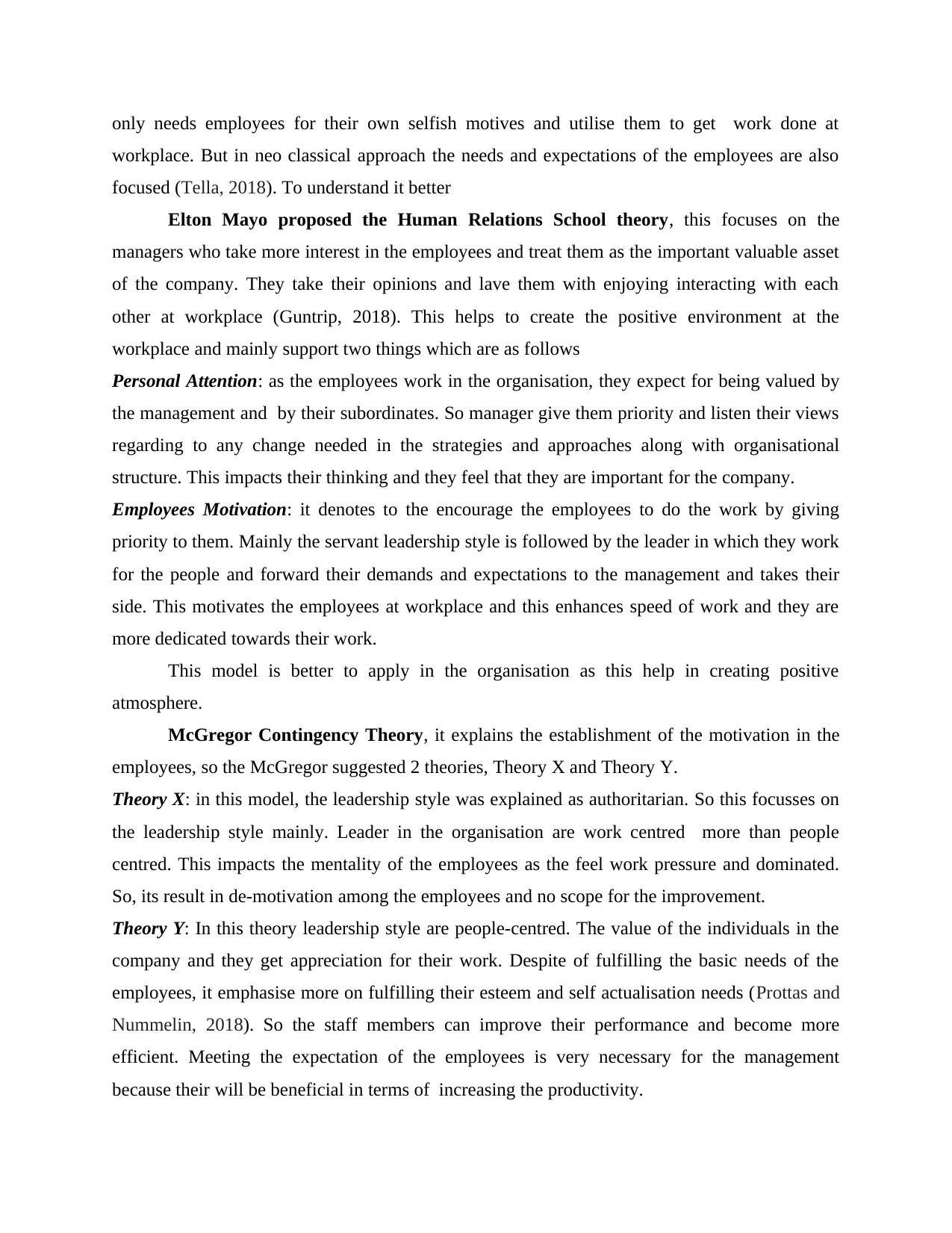
only needs employees for their own selfish motives and utilise them to get work done at
workplace. But in neo classical approach the needs and expectations of the employees are also
focused (Tella, 2018). To understand it better
Elton Mayo proposed the Human Relations School theory, this focuses on the
managers who take more interest in the employees and treat them as the important valuable asset
of the company. They take their opinions and lave them with enjoying interacting with each
other at workplace (Guntrip, 2018). This helps to create the positive environment at the
workplace and mainly support two things which are as follows
Personal Attention: as the employees work in the organisation, they expect for being valued by
the management and by their subordinates. So manager give them priority and listen their views
regarding to any change needed in the strategies and approaches along with organisational
structure. This impacts their thinking and they feel that they are important for the company.
Employees Motivation: it denotes to the encourage the employees to do the work by giving
priority to them. Mainly the servant leadership style is followed by the leader in which they work
for the people and forward their demands and expectations to the management and takes their
side. This motivates the employees at workplace and this enhances speed of work and they are
more dedicated towards their work.
This model is better to apply in the organisation as this help in creating positive
atmosphere.
McGregor Contingency Theory, it explains the establishment of the motivation in the
employees, so the McGregor suggested 2 theories, Theory X and Theory Y.
Theory X: in this model, the leadership style was explained as authoritarian. So this focusses on
the leadership style mainly. Leader in the organisation are work centred more than people
centred. This impacts the mentality of the employees as the feel work pressure and dominated.
So, its result in de-motivation among the employees and no scope for the improvement.
Theory Y: In this theory leadership style are people-centred. The value of the individuals in the
company and they get appreciation for their work. Despite of fulfilling the basic needs of the
employees, it emphasise more on fulfilling their esteem and self actualisation needs (Prottas and
Nummelin, 2018). So the staff members can improve their performance and become more
efficient. Meeting the expectation of the employees is very necessary for the management
because their will be beneficial in terms of increasing the productivity.
workplace. But in neo classical approach the needs and expectations of the employees are also
focused (Tella, 2018). To understand it better
Elton Mayo proposed the Human Relations School theory, this focuses on the
managers who take more interest in the employees and treat them as the important valuable asset
of the company. They take their opinions and lave them with enjoying interacting with each
other at workplace (Guntrip, 2018). This helps to create the positive environment at the
workplace and mainly support two things which are as follows
Personal Attention: as the employees work in the organisation, they expect for being valued by
the management and by their subordinates. So manager give them priority and listen their views
regarding to any change needed in the strategies and approaches along with organisational
structure. This impacts their thinking and they feel that they are important for the company.
Employees Motivation: it denotes to the encourage the employees to do the work by giving
priority to them. Mainly the servant leadership style is followed by the leader in which they work
for the people and forward their demands and expectations to the management and takes their
side. This motivates the employees at workplace and this enhances speed of work and they are
more dedicated towards their work.
This model is better to apply in the organisation as this help in creating positive
atmosphere.
McGregor Contingency Theory, it explains the establishment of the motivation in the
employees, so the McGregor suggested 2 theories, Theory X and Theory Y.
Theory X: in this model, the leadership style was explained as authoritarian. So this focusses on
the leadership style mainly. Leader in the organisation are work centred more than people
centred. This impacts the mentality of the employees as the feel work pressure and dominated.
So, its result in de-motivation among the employees and no scope for the improvement.
Theory Y: In this theory leadership style are people-centred. The value of the individuals in the
company and they get appreciation for their work. Despite of fulfilling the basic needs of the
employees, it emphasise more on fulfilling their esteem and self actualisation needs (Prottas and
Nummelin, 2018). So the staff members can improve their performance and become more
efficient. Meeting the expectation of the employees is very necessary for the management
because their will be beneficial in terms of increasing the productivity.
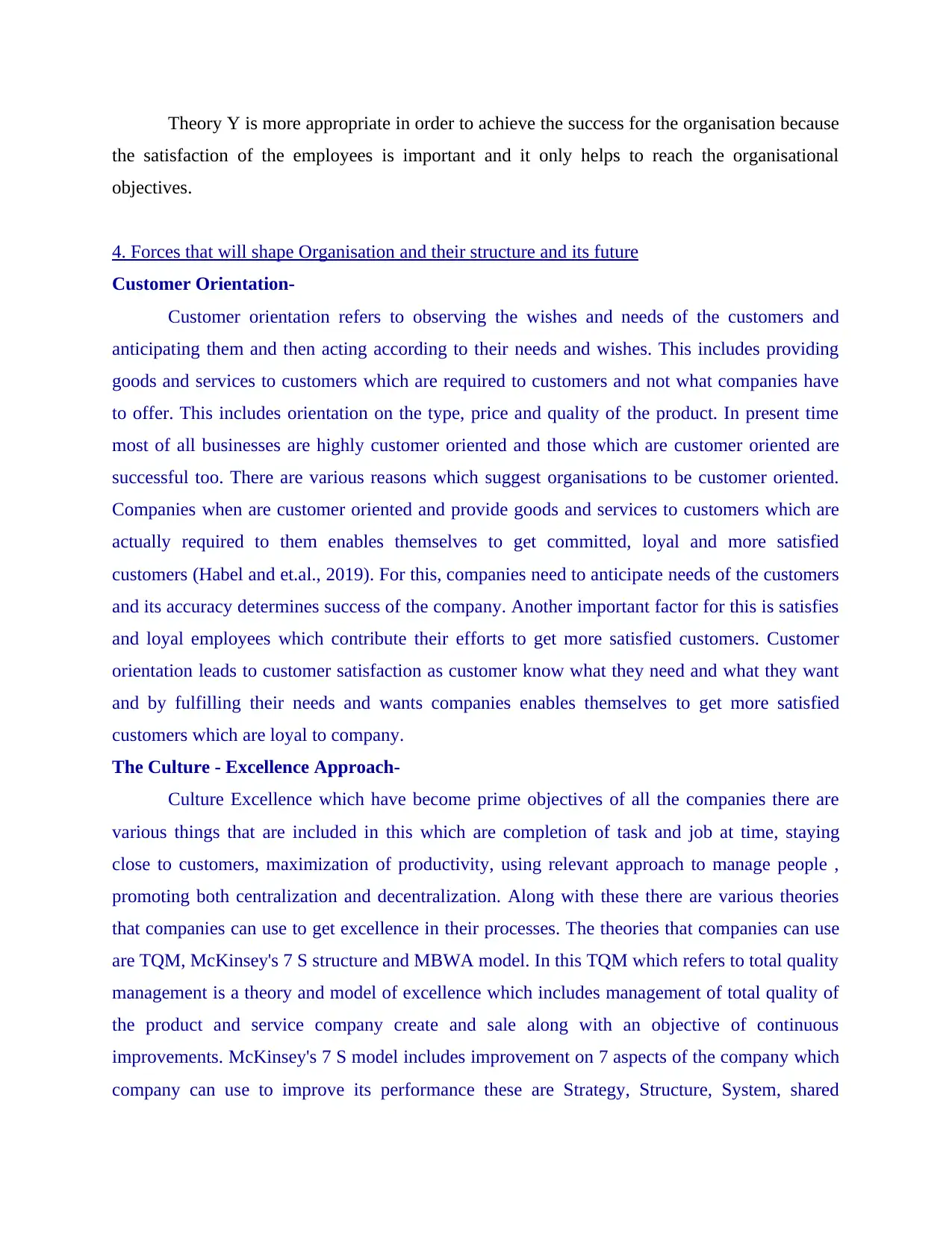
Theory Y is more appropriate in order to achieve the success for the organisation because
the satisfaction of the employees is important and it only helps to reach the organisational
objectives.
4. Forces that will shape Organisation and their structure and its future
Customer Orientation-
Customer orientation refers to observing the wishes and needs of the customers and
anticipating them and then acting according to their needs and wishes. This includes providing
goods and services to customers which are required to customers and not what companies have
to offer. This includes orientation on the type, price and quality of the product. In present time
most of all businesses are highly customer oriented and those which are customer oriented are
successful too. There are various reasons which suggest organisations to be customer oriented.
Companies when are customer oriented and provide goods and services to customers which are
actually required to them enables themselves to get committed, loyal and more satisfied
customers (Habel and et.al., 2019). For this, companies need to anticipate needs of the customers
and its accuracy determines success of the company. Another important factor for this is satisfies
and loyal employees which contribute their efforts to get more satisfied customers. Customer
orientation leads to customer satisfaction as customer know what they need and what they want
and by fulfilling their needs and wants companies enables themselves to get more satisfied
customers which are loyal to company.
The Culture - Excellence Approach-
Culture Excellence which have become prime objectives of all the companies there are
various things that are included in this which are completion of task and job at time, staying
close to customers, maximization of productivity, using relevant approach to manage people ,
promoting both centralization and decentralization. Along with these there are various theories
that companies can use to get excellence in their processes. The theories that companies can use
are TQM, McKinsey's 7 S structure and MBWA model. In this TQM which refers to total quality
management is a theory and model of excellence which includes management of total quality of
the product and service company create and sale along with an objective of continuous
improvements. McKinsey's 7 S model includes improvement on 7 aspects of the company which
company can use to improve its performance these are Strategy, Structure, System, shared
the satisfaction of the employees is important and it only helps to reach the organisational
objectives.
4. Forces that will shape Organisation and their structure and its future
Customer Orientation-
Customer orientation refers to observing the wishes and needs of the customers and
anticipating them and then acting according to their needs and wishes. This includes providing
goods and services to customers which are required to customers and not what companies have
to offer. This includes orientation on the type, price and quality of the product. In present time
most of all businesses are highly customer oriented and those which are customer oriented are
successful too. There are various reasons which suggest organisations to be customer oriented.
Companies when are customer oriented and provide goods and services to customers which are
actually required to them enables themselves to get committed, loyal and more satisfied
customers (Habel and et.al., 2019). For this, companies need to anticipate needs of the customers
and its accuracy determines success of the company. Another important factor for this is satisfies
and loyal employees which contribute their efforts to get more satisfied customers. Customer
orientation leads to customer satisfaction as customer know what they need and what they want
and by fulfilling their needs and wants companies enables themselves to get more satisfied
customers which are loyal to company.
The Culture - Excellence Approach-
Culture Excellence which have become prime objectives of all the companies there are
various things that are included in this which are completion of task and job at time, staying
close to customers, maximization of productivity, using relevant approach to manage people ,
promoting both centralization and decentralization. Along with these there are various theories
that companies can use to get excellence in their processes. The theories that companies can use
are TQM, McKinsey's 7 S structure and MBWA model. In this TQM which refers to total quality
management is a theory and model of excellence which includes management of total quality of
the product and service company create and sale along with an objective of continuous
improvements. McKinsey's 7 S model includes improvement on 7 aspects of the company which
company can use to improve its performance these are Strategy, Structure, System, shared
⊘ This is a preview!⊘
Do you want full access?
Subscribe today to unlock all pages.

Trusted by 1+ million students worldwide
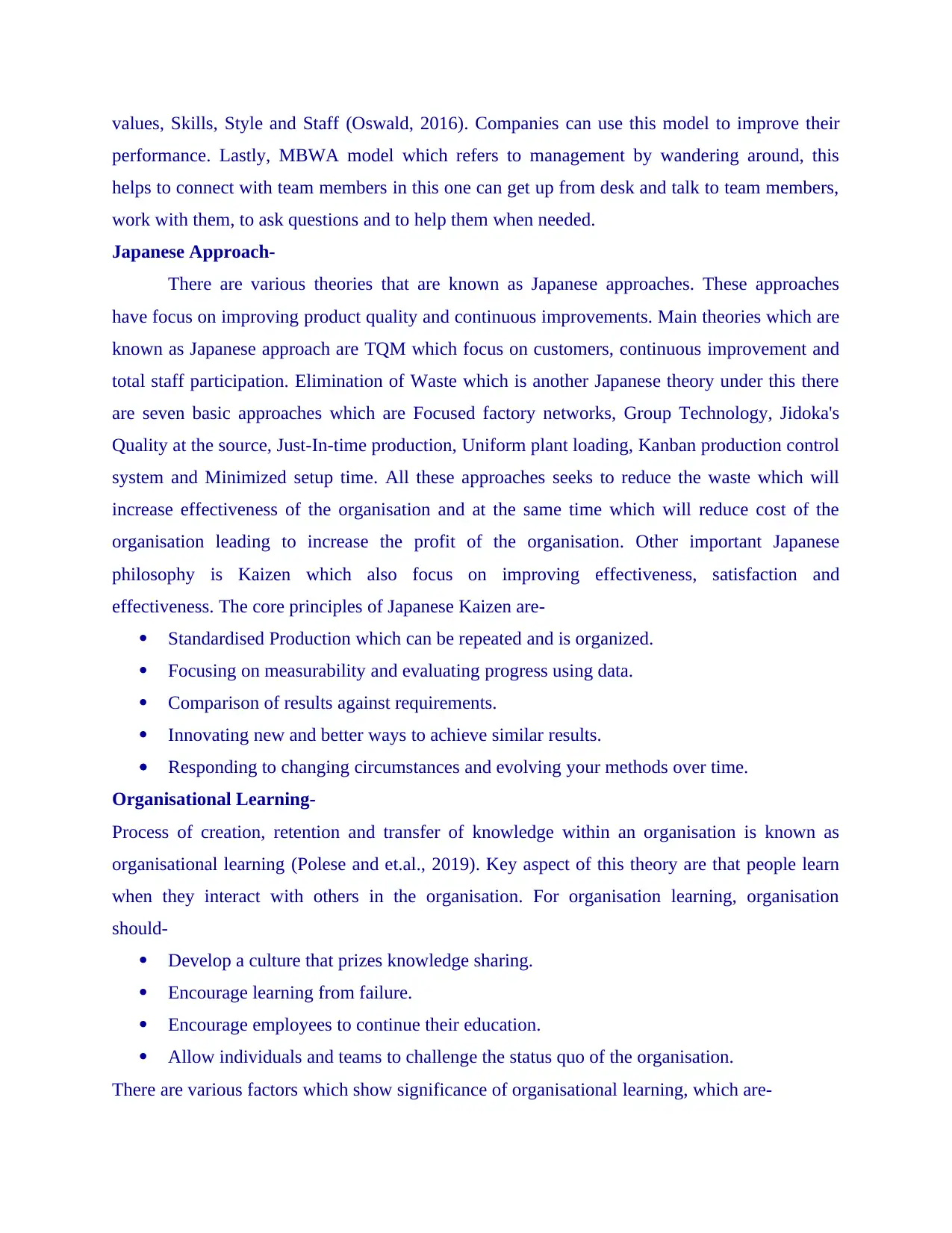
values, Skills, Style and Staff (Oswald, 2016). Companies can use this model to improve their
performance. Lastly, MBWA model which refers to management by wandering around, this
helps to connect with team members in this one can get up from desk and talk to team members,
work with them, to ask questions and to help them when needed.
Japanese Approach-
There are various theories that are known as Japanese approaches. These approaches
have focus on improving product quality and continuous improvements. Main theories which are
known as Japanese approach are TQM which focus on customers, continuous improvement and
total staff participation. Elimination of Waste which is another Japanese theory under this there
are seven basic approaches which are Focused factory networks, Group Technology, Jidoka's
Quality at the source, Just-In-time production, Uniform plant loading, Kanban production control
system and Minimized setup time. All these approaches seeks to reduce the waste which will
increase effectiveness of the organisation and at the same time which will reduce cost of the
organisation leading to increase the profit of the organisation. Other important Japanese
philosophy is Kaizen which also focus on improving effectiveness, satisfaction and
effectiveness. The core principles of Japanese Kaizen are-
Standardised Production which can be repeated and is organized.
Focusing on measurability and evaluating progress using data.
Comparison of results against requirements.
Innovating new and better ways to achieve similar results.
Responding to changing circumstances and evolving your methods over time.
Organisational Learning-
Process of creation, retention and transfer of knowledge within an organisation is known as
organisational learning (Polese and et.al., 2019). Key aspect of this theory are that people learn
when they interact with others in the organisation. For organisation learning, organisation
should-
Develop a culture that prizes knowledge sharing.
Encourage learning from failure.
Encourage employees to continue their education.
Allow individuals and teams to challenge the status quo of the organisation.
There are various factors which show significance of organisational learning, which are-
performance. Lastly, MBWA model which refers to management by wandering around, this
helps to connect with team members in this one can get up from desk and talk to team members,
work with them, to ask questions and to help them when needed.
Japanese Approach-
There are various theories that are known as Japanese approaches. These approaches
have focus on improving product quality and continuous improvements. Main theories which are
known as Japanese approach are TQM which focus on customers, continuous improvement and
total staff participation. Elimination of Waste which is another Japanese theory under this there
are seven basic approaches which are Focused factory networks, Group Technology, Jidoka's
Quality at the source, Just-In-time production, Uniform plant loading, Kanban production control
system and Minimized setup time. All these approaches seeks to reduce the waste which will
increase effectiveness of the organisation and at the same time which will reduce cost of the
organisation leading to increase the profit of the organisation. Other important Japanese
philosophy is Kaizen which also focus on improving effectiveness, satisfaction and
effectiveness. The core principles of Japanese Kaizen are-
Standardised Production which can be repeated and is organized.
Focusing on measurability and evaluating progress using data.
Comparison of results against requirements.
Innovating new and better ways to achieve similar results.
Responding to changing circumstances and evolving your methods over time.
Organisational Learning-
Process of creation, retention and transfer of knowledge within an organisation is known as
organisational learning (Polese and et.al., 2019). Key aspect of this theory are that people learn
when they interact with others in the organisation. For organisation learning, organisation
should-
Develop a culture that prizes knowledge sharing.
Encourage learning from failure.
Encourage employees to continue their education.
Allow individuals and teams to challenge the status quo of the organisation.
There are various factors which show significance of organisational learning, which are-
Paraphrase This Document
Need a fresh take? Get an instant paraphrase of this document with our AI Paraphraser
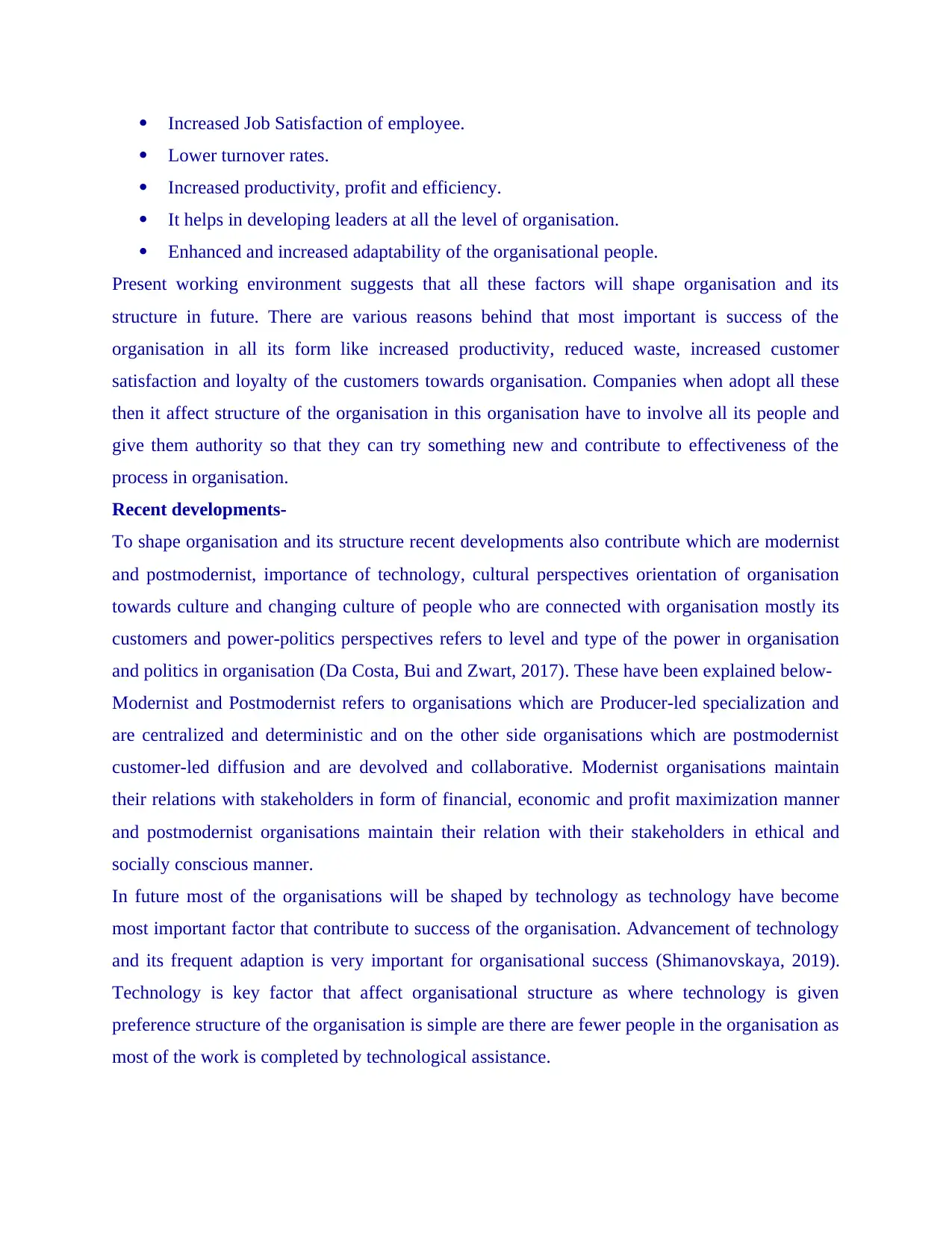
Increased Job Satisfaction of employee.
Lower turnover rates.
Increased productivity, profit and efficiency.
It helps in developing leaders at all the level of organisation.
Enhanced and increased adaptability of the organisational people.
Present working environment suggests that all these factors will shape organisation and its
structure in future. There are various reasons behind that most important is success of the
organisation in all its form like increased productivity, reduced waste, increased customer
satisfaction and loyalty of the customers towards organisation. Companies when adopt all these
then it affect structure of the organisation in this organisation have to involve all its people and
give them authority so that they can try something new and contribute to effectiveness of the
process in organisation.
Recent developments-
To shape organisation and its structure recent developments also contribute which are modernist
and postmodernist, importance of technology, cultural perspectives orientation of organisation
towards culture and changing culture of people who are connected with organisation mostly its
customers and power-politics perspectives refers to level and type of the power in organisation
and politics in organisation (Da Costa, Bui and Zwart, 2017). These have been explained below-
Modernist and Postmodernist refers to organisations which are Producer-led specialization and
are centralized and deterministic and on the other side organisations which are postmodernist
customer-led diffusion and are devolved and collaborative. Modernist organisations maintain
their relations with stakeholders in form of financial, economic and profit maximization manner
and postmodernist organisations maintain their relation with their stakeholders in ethical and
socially conscious manner.
In future most of the organisations will be shaped by technology as technology have become
most important factor that contribute to success of the organisation. Advancement of technology
and its frequent adaption is very important for organisational success (Shimanovskaya, 2019).
Technology is key factor that affect organisational structure as where technology is given
preference structure of the organisation is simple are there are fewer people in the organisation as
most of the work is completed by technological assistance.
Lower turnover rates.
Increased productivity, profit and efficiency.
It helps in developing leaders at all the level of organisation.
Enhanced and increased adaptability of the organisational people.
Present working environment suggests that all these factors will shape organisation and its
structure in future. There are various reasons behind that most important is success of the
organisation in all its form like increased productivity, reduced waste, increased customer
satisfaction and loyalty of the customers towards organisation. Companies when adopt all these
then it affect structure of the organisation in this organisation have to involve all its people and
give them authority so that they can try something new and contribute to effectiveness of the
process in organisation.
Recent developments-
To shape organisation and its structure recent developments also contribute which are modernist
and postmodernist, importance of technology, cultural perspectives orientation of organisation
towards culture and changing culture of people who are connected with organisation mostly its
customers and power-politics perspectives refers to level and type of the power in organisation
and politics in organisation (Da Costa, Bui and Zwart, 2017). These have been explained below-
Modernist and Postmodernist refers to organisations which are Producer-led specialization and
are centralized and deterministic and on the other side organisations which are postmodernist
customer-led diffusion and are devolved and collaborative. Modernist organisations maintain
their relations with stakeholders in form of financial, economic and profit maximization manner
and postmodernist organisations maintain their relation with their stakeholders in ethical and
socially conscious manner.
In future most of the organisations will be shaped by technology as technology have become
most important factor that contribute to success of the organisation. Advancement of technology
and its frequent adaption is very important for organisational success (Shimanovskaya, 2019).
Technology is key factor that affect organisational structure as where technology is given
preference structure of the organisation is simple are there are fewer people in the organisation as
most of the work is completed by technological assistance.
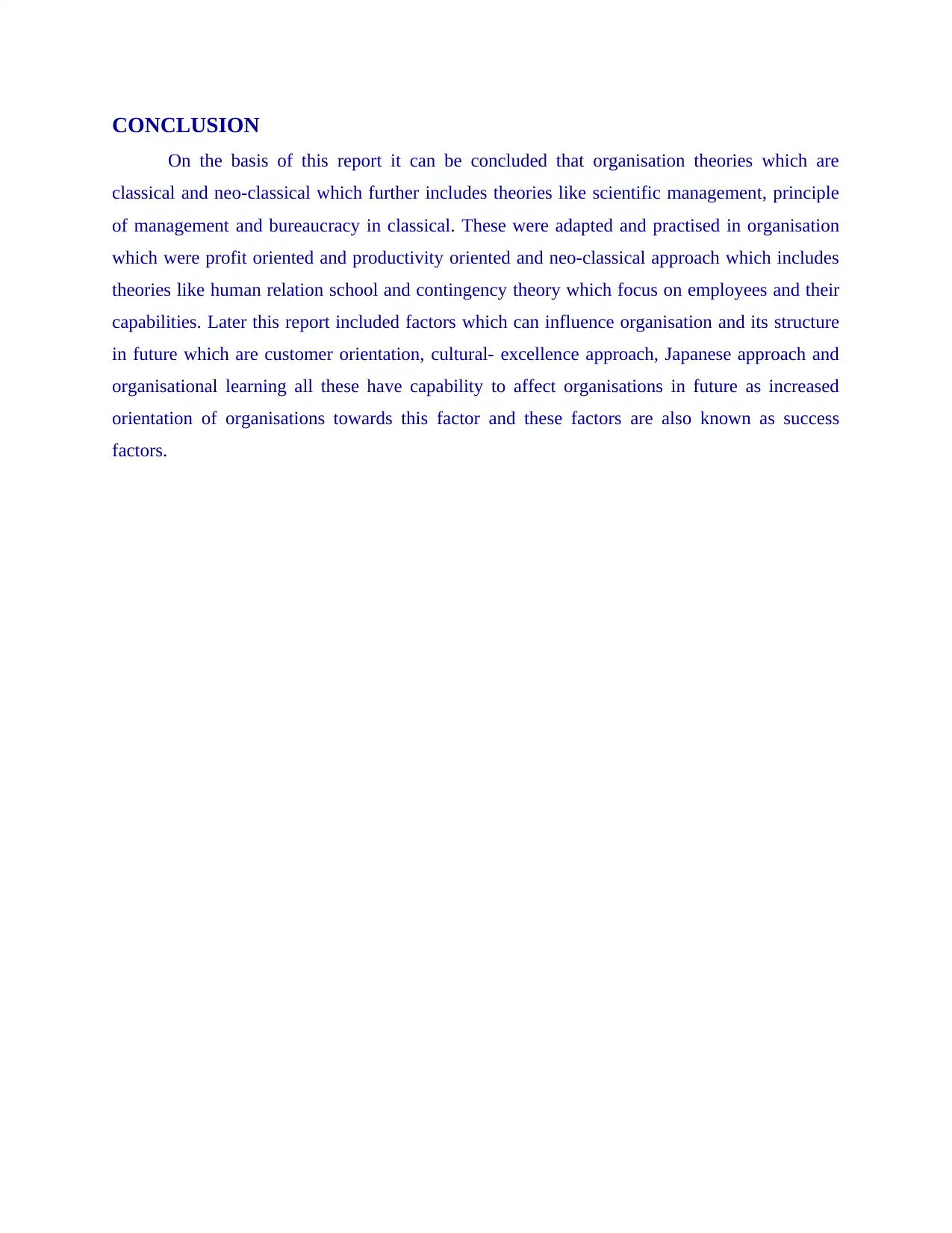
CONCLUSION
On the basis of this report it can be concluded that organisation theories which are
classical and neo-classical which further includes theories like scientific management, principle
of management and bureaucracy in classical. These were adapted and practised in organisation
which were profit oriented and productivity oriented and neo-classical approach which includes
theories like human relation school and contingency theory which focus on employees and their
capabilities. Later this report included factors which can influence organisation and its structure
in future which are customer orientation, cultural- excellence approach, Japanese approach and
organisational learning all these have capability to affect organisations in future as increased
orientation of organisations towards this factor and these factors are also known as success
factors.
On the basis of this report it can be concluded that organisation theories which are
classical and neo-classical which further includes theories like scientific management, principle
of management and bureaucracy in classical. These were adapted and practised in organisation
which were profit oriented and productivity oriented and neo-classical approach which includes
theories like human relation school and contingency theory which focus on employees and their
capabilities. Later this report included factors which can influence organisation and its structure
in future which are customer orientation, cultural- excellence approach, Japanese approach and
organisational learning all these have capability to affect organisations in future as increased
orientation of organisations towards this factor and these factors are also known as success
factors.
⊘ This is a preview!⊘
Do you want full access?
Subscribe today to unlock all pages.

Trusted by 1+ million students worldwide

Paraphrase This Document
Need a fresh take? Get an instant paraphrase of this document with our AI Paraphraser
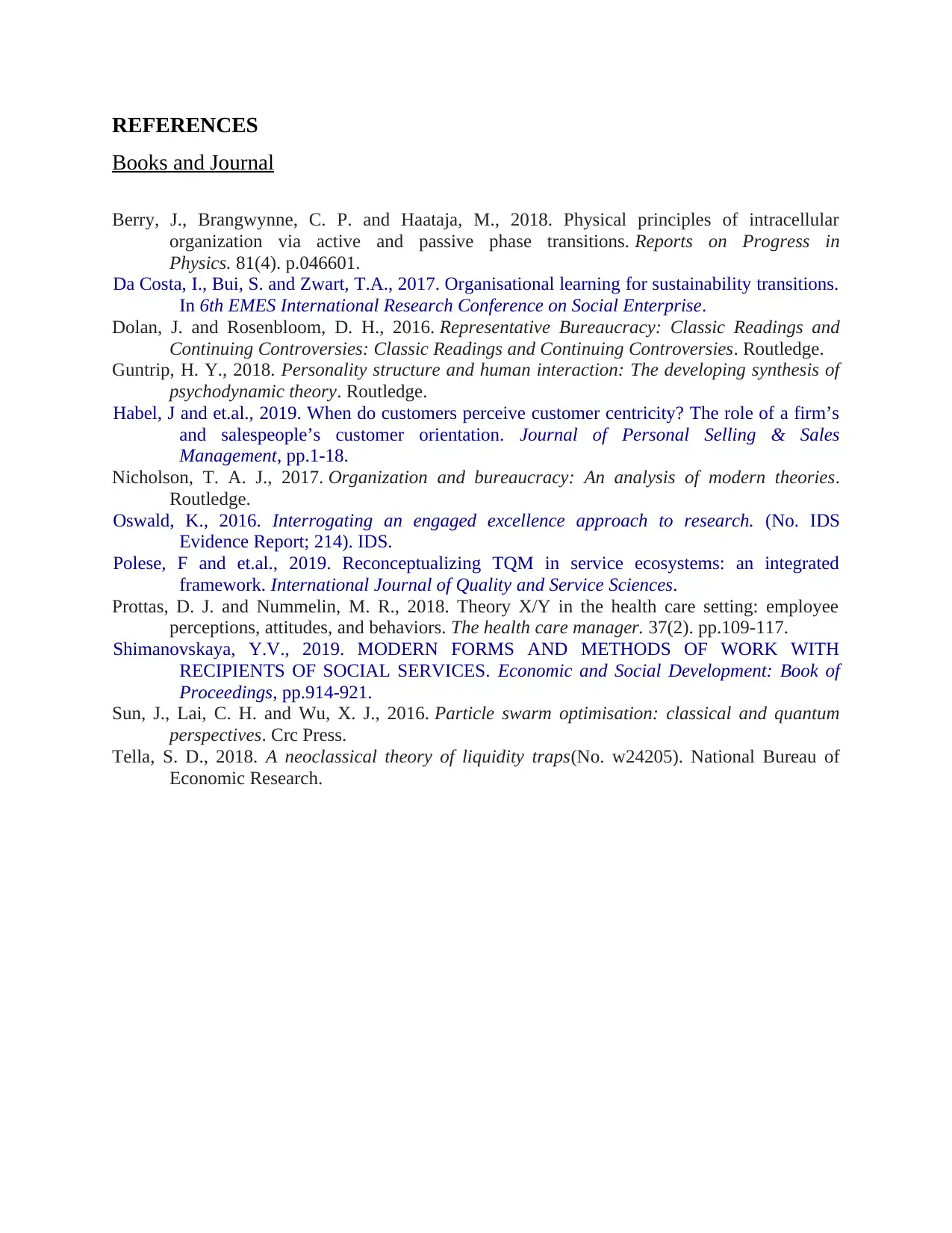
REFERENCES
Books and Journal
Berry, J., Brangwynne, C. P. and Haataja, M., 2018. Physical principles of intracellular
organization via active and passive phase transitions. Reports on Progress in
Physics. 81(4). p.046601.
Da Costa, I., Bui, S. and Zwart, T.A., 2017. Organisational learning for sustainability transitions.
In 6th EMES International Research Conference on Social Enterprise.
Dolan, J. and Rosenbloom, D. H., 2016. Representative Bureaucracy: Classic Readings and
Continuing Controversies: Classic Readings and Continuing Controversies. Routledge.
Guntrip, H. Y., 2018. Personality structure and human interaction: The developing synthesis of
psychodynamic theory. Routledge.
Habel, J and et.al., 2019. When do customers perceive customer centricity? The role of a firm’s
and salespeople’s customer orientation. Journal of Personal Selling & Sales
Management, pp.1-18.
Nicholson, T. A. J., 2017. Organization and bureaucracy: An analysis of modern theories.
Routledge.
Oswald, K., 2016. Interrogating an engaged excellence approach to research. (No. IDS
Evidence Report; 214). IDS.
Polese, F and et.al., 2019. Reconceptualizing TQM in service ecosystems: an integrated
framework. International Journal of Quality and Service Sciences.
Prottas, D. J. and Nummelin, M. R., 2018. Theory X/Y in the health care setting: employee
perceptions, attitudes, and behaviors. The health care manager. 37(2). pp.109-117.
Shimanovskaya, Y.V., 2019. MODERN FORMS AND METHODS OF WORK WITH
RECIPIENTS OF SOCIAL SERVICES. Economic and Social Development: Book of
Proceedings, pp.914-921.
Sun, J., Lai, C. H. and Wu, X. J., 2016. Particle swarm optimisation: classical and quantum
perspectives. Crc Press.
Tella, S. D., 2018. A neoclassical theory of liquidity traps(No. w24205). National Bureau of
Economic Research.
Books and Journal
Berry, J., Brangwynne, C. P. and Haataja, M., 2018. Physical principles of intracellular
organization via active and passive phase transitions. Reports on Progress in
Physics. 81(4). p.046601.
Da Costa, I., Bui, S. and Zwart, T.A., 2017. Organisational learning for sustainability transitions.
In 6th EMES International Research Conference on Social Enterprise.
Dolan, J. and Rosenbloom, D. H., 2016. Representative Bureaucracy: Classic Readings and
Continuing Controversies: Classic Readings and Continuing Controversies. Routledge.
Guntrip, H. Y., 2018. Personality structure and human interaction: The developing synthesis of
psychodynamic theory. Routledge.
Habel, J and et.al., 2019. When do customers perceive customer centricity? The role of a firm’s
and salespeople’s customer orientation. Journal of Personal Selling & Sales
Management, pp.1-18.
Nicholson, T. A. J., 2017. Organization and bureaucracy: An analysis of modern theories.
Routledge.
Oswald, K., 2016. Interrogating an engaged excellence approach to research. (No. IDS
Evidence Report; 214). IDS.
Polese, F and et.al., 2019. Reconceptualizing TQM in service ecosystems: an integrated
framework. International Journal of Quality and Service Sciences.
Prottas, D. J. and Nummelin, M. R., 2018. Theory X/Y in the health care setting: employee
perceptions, attitudes, and behaviors. The health care manager. 37(2). pp.109-117.
Shimanovskaya, Y.V., 2019. MODERN FORMS AND METHODS OF WORK WITH
RECIPIENTS OF SOCIAL SERVICES. Economic and Social Development: Book of
Proceedings, pp.914-921.
Sun, J., Lai, C. H. and Wu, X. J., 2016. Particle swarm optimisation: classical and quantum
perspectives. Crc Press.
Tella, S. D., 2018. A neoclassical theory of liquidity traps(No. w24205). National Bureau of
Economic Research.
1 out of 11
Related Documents
Your All-in-One AI-Powered Toolkit for Academic Success.
+13062052269
info@desklib.com
Available 24*7 on WhatsApp / Email
![[object Object]](/_next/static/media/star-bottom.7253800d.svg)
Unlock your academic potential
Copyright © 2020–2026 A2Z Services. All Rights Reserved. Developed and managed by ZUCOL.





